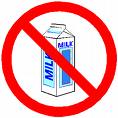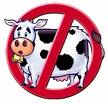Organic Milk

ORGANIC MILK. Is it better for us than regular milk? Or should we eliminate milk from our diets all together?
According to the National Geographic, The Green Guide, the number one reason why consumers buy milk that is organic because it contains no synthetic hormones.
This is great, more people are buying organic milk, but should we even buy cow’s milk even though it is organic??
Here are the three standards farmers must follow to label their organic:
- Cows that have not been treated with bovine growth hormone (BGH).
- Cows are not treated with antibiotics.
- Cows’ feed is grown without pesticides, whether the feed is grass or grain. O.k. well this sounds good?
Hopefully we are all drinking milk that is coming from a cow with good nutrition and minimal stress to keep them healthy, happy and productive and the cows are eating only 100% organic feed, grown without toxic, pesticides and fertilizers.
But, do you really want to drink cow’s milk?

– NO MILK, no milk for my cereal, no milk for my coffee, no milk to use in my recipes.
But I am here to tell you cow’s milk is not good for you, your family or your children.
The only thing cow’s milk is good for is to feed calves.

Most regular and organic milk is pasteurization, homogenized, or ultra-pasteurized which means processed. There’s that word again, “processed”.

Processed cow's milk is bad for your health and bad for the cows who gives it. It's great for corporate profits, however, and that's why milk continues to be so heavily marketed as a nutritional beverage.
And it's no surprise that infant formula manufacturers have, for decades, tried to convince mothers that cow's milk is better for their baby than human breast milk.
(See Breast Milk, and Cow's Milk).

YOUR DECISION
This is totally your decision if you wish to stop serving milk to your family after reading this page.
You can stop altogether, or at least start out with organic, switch to almond or cashew milk.
Raw almond milk
It's made from raw, soaked almonds, water, vanilla and a pinch of sea salt. You make this yourself using a Vita-Mix.
Definition of Organic Milk from Wikipedia.



